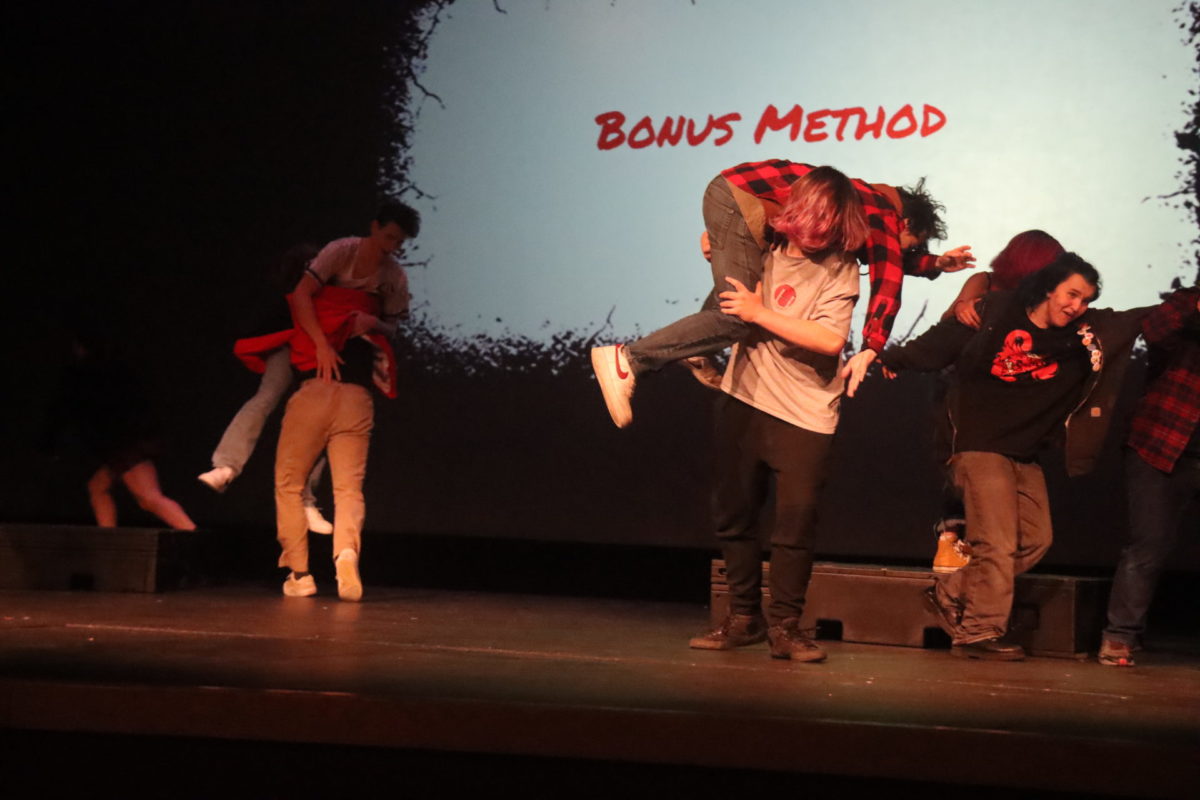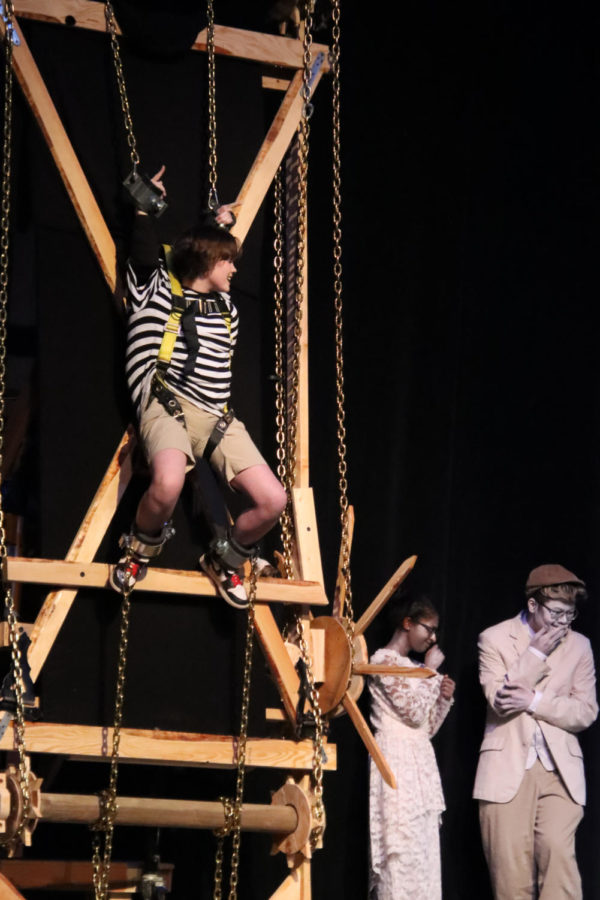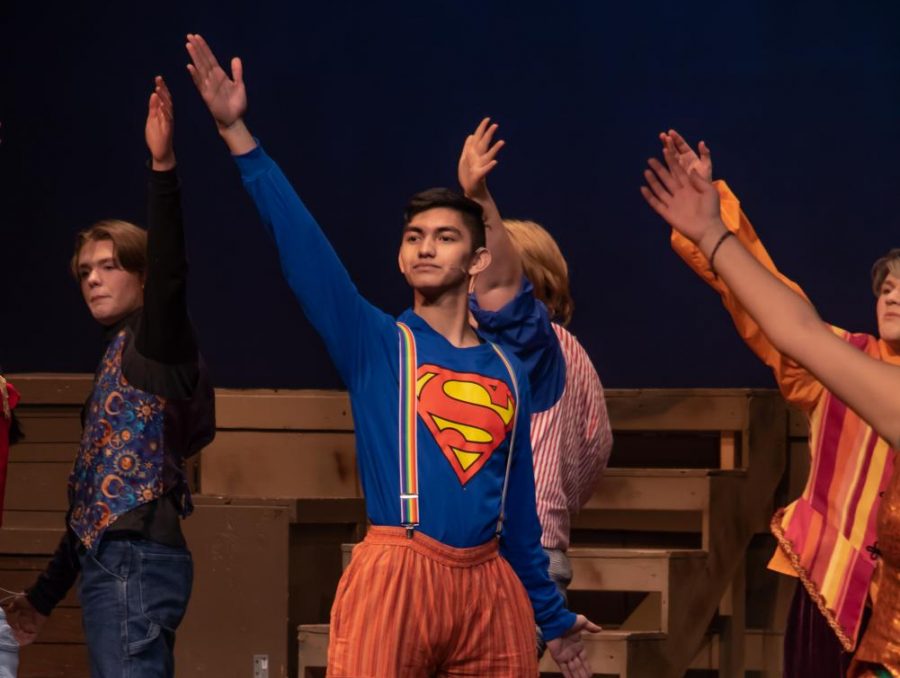After she watched the local student activism about gun violence following the events in Parkland, Florida, drama teacher Jeannie Brzovic decided it was time for her students to join the conversation. The drama department performed “Bang Bang You’re Dead,” a stage reading set in the aftermath of a school shooting, on March 2 during third to sixth period. Playwright William Mastrosimone wrote the play after his son pointed out the shooting at Oregon’s Thurston High School in the newspaper.
The stage reading consisted of Josh (Seth Timple), the school shooter, who is haunted in jail by five of his victims. In the MTHS interpretation, the five performers who represented ghosts wore white shirts while five other performers wore black shirts to represent the voices in Josh’s head and portray events leading up to the shooting.
After ending his relationship with his mom (Rhiannon Aguilar) and dad (Paul Pratt), Josh goes to school and kills his classmates, some intentionally and some accidentally. Inside Josh’s head, five dead classmates confront him one by one. These five victims included Emily (Peja Shymko), who was Josh’s childhood friend and neighbor; Katie (Olivia Parsons), who was Josh’s girlfriend before breaking up with him because Josh went hunting instead of taking her to the movies; Michael (Eli Longacre), who was Katie’s new boyfriend after the breakup; Jessie (Amy Harris), who was Emily’s friend; and Matt (Ty Harden), who had never met Josh before the shooting.
The deceased all ask the same, simple question: “Why me?” However, Josh refuses to answer them.
They surround him, describing the “hell” in which he will live until he gives them a satisfactory answer. He ignores them at first, but the ghosts of the deceased throw him into a coffin. Josh screams until he is let out of the coffin, and he begins to look at the ghosts with new respect.
Narrated by the ghosts, Josh flashes back to a hunting trip he went on with his grandpa (Neil Wiborg). On the trip, Josh sees a buck, but he can’t kill it. The ghosts describe Josh’s struggle in five lines that are repeated six times throughout the play:
Michael: So you make your face a mask.
Katie: A mask that hides your face.
Matt: A face that hides the pain.
Jesse: A pain that eats your heart.
Emily: A heart nobody knows.
Josh kills the buck and is tormented by his actions. His grandpa is proud of him, but Josh hides his tears and grieves silently. After the trip, things start to go downhill for Josh. Katie breaks up with him; Josh’s parents send him to a psychotherapist; and students spread rumors about him. He contemplates suicide as the voices taunt him, gradually overwhelming him. A voice in the dark tells Josh, “Then you have to stop the voices another way, Josh.”
Josh kills his parents, revealing the daily pain he endured. As the scene changes, the ghosts ask once more why Josh killed them while smearing ketchup where their bullet wounds were. Then, they sit down and spoke about what they miss about living, and what they will never be able to do. In realization, Josh cries, “I never thought I was taking away all that.”
The ghosts tell Josh that they will haunt him for the rest of his life. Shouting “DEAD!” the deceased fall down onto the ground one by one. The play concludes with Josh’s monologue:
I didn’t know it would be forever. I thought it was “bang bang you’re dead” again.
I thought I could just hit the reset button and start over.
Why can’t I have another chance?
When I killed you I killed all my possibilities, too.
I’ll never have anything to look forward to.
Never.
Is this the rest of my life?
(Josh goes to his knees, devastated)
Oh God.
After the MTHS performance, the drama department and hosted a forum regarding the play. Counselor Julie Petterson and social worker Latisha Williams were there to help answer any questions the audience had. In addition, they reminded everyone that they were at the school to support everyone. They talked about their similar challenges when they went to high school, showing that they understand and can help.
“When you think about how events occur, it doesn’t just affect the person that you’re angry with or the people making you angry with, it affects their family and their friends. And then it affects the school community and the community at large. And look how Parkland, Florida affected the nation,” Brzovic said as she opened the forum.
When asked what the emotional toll was to perform this play, sophomore actress Amy Harris said, “I didn’t recognize the names of the shootings that they mentioned: ‘Paducah. Jonesboro. Springfield.’ I think this spoke to how these things fade from public memory. That shouldn’t happen because people died and to let things like that fade from our public consciousness and our discussions, it’s not something we should let happen and I think by putting on shows like this and keeping the discussion alive is really crucial.”
As the forum progressed, many in the audience opened up about their own personal struggles and challenges. There were discussions about depression and suicide. Most agreed that they related to Josh’s issues and they found that frightening. Some expressed a fear of suddenly becoming Josh. In the play, Josh felt neglected and invisible to the world around him. However, is was agreed that his method of dealing with his own problems was unacceptable and unforgivable. Josh may have been a simply misunderstood person in some parts of the play, but he secured his guilt-ridden fate when he killed those seven people.
After the school shooting at Thurston High School, Mastrosimone and Thurston High School drama instructor Michael Fisher wrote “Bang Bang You’re Dead” in the midst of three school shootings: Heath High School on Dec. 4, 1997 in Paducah, Kentucky; Westside Middle School on March 23, 1998 in Jonesboro, Arkansas; and Thurston High School on May 21, 1998. The cities of these shootings are alluded to five times throughout the play:
Deceased: Paducah. Jonesboro. Springfield.
Since its first premiere in April 7, 1999; “Bang Bang You’re Dead” was written to raise awareness about school violence. The play was first performed by Thurston high school students, some of whom were wounded in the shooting.
The play was first received with much controversy because many thought that Mastrosimone was using recent tragedies to make money. However, Mastrosimone only wanted to raise awareness, and he asked to receive no royalties from the piece and that no admission be charged at viewings. He purposely made the play widely accessible with hopes that high schools all across America could perform the play to raise awareness about school violence in their local communities. The script for the “Bang Bang You’re Dead” is free and is available here.
In light of recent events from Marysville to Parkland, the MTHS drama department chose to perform “Bang Bang You’re Dead” in an effort to support student activism for prevention of school violence. One of the main focuses of the recent student activism included demands for better gun control.
Even though the play was originally performed just two weeks before the shootings at Columbine High School in Colorado, “Bang Bang You’re Dead” has been an outlet to portray and show the tragedy of school violence. This play is still relevant because so many school shootings happen today due to lack of action to prevent school violence. In more recent events which include Santa Fe High School and Mt. Zion High School, the play’s overall message against school violence is echoed through the humanization of the deceased students. In the play, there were five people who were killed: Emily, Katie, Michael, Jessie and Matt. Each life is incredibly vivid and full of potential, but that was taken from them.
Currently, people have been taking actions to spread awareness about school violence and school shootings. One such action includes the trending #IfIDieInASchoolShooting where teens share what they’ll miss in life if they died in a school shooting. This hashtag is similar to what the deceased victims did when they told Josh about what they would miss about living.
—————————————————————————————————————————-
In the event that a person is struggling with any of the mentioned topics, it is recommended to seek help. One may reach out to a friend or trusted adult. In addition, the MTHS counseling office is open for walk-in meetings anything during first or second lunch; one may also schedule an appointment if one so desires to meet with a counselor during or after school hours. People are here to help because when a person begins to talk about it, it gets easier.
MTHS hotlines
Social Worker, Student Support Advocate
- Latisha Williams
- Phone: 425-431-5725
- Email: Wi**********@ed*****.edu
Counselors
- Allison Hong
- Phone: (425) 431-1738
- Email: Ho***@ed*****.edu
- Tanya Benvenuti
- Phone: (425) 431-5665
- Email: Be********@ed*****.edu
- Brad Serka
- Phone: (425) 431-5659
- Email: Se****@ed*****.edu
- Julie Petterson
- Phone: (425) 431-5658
- Email: Pe*******@ed*****.edu
Counseling Secretary
- Kim Runkel
- Phone: (425) 431-5663
- Email: Ru*****@ed*****.edu
Crisis hotlines
- Teen Link
- 1-866-TEENLINK
- (866) 833-6546
- Crisis Text Line
- Text HOME to 741741
- National Suicide Prevention Lifeline
- 1-800-273-8225
Addition resources from advocacy organizations
- Suicide prevention
- Mental health
- Bullying
- School Counselors
- Gun violence prevention




